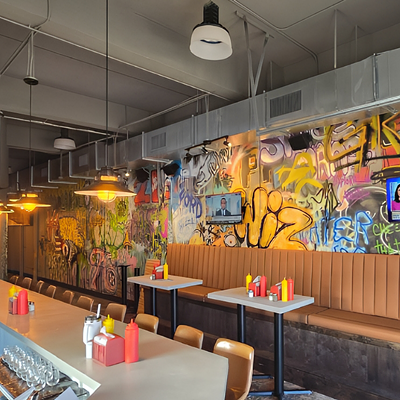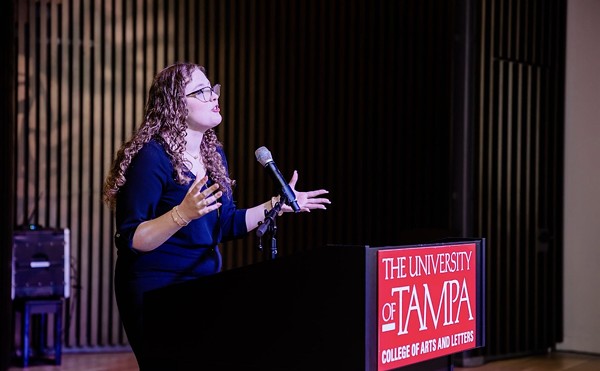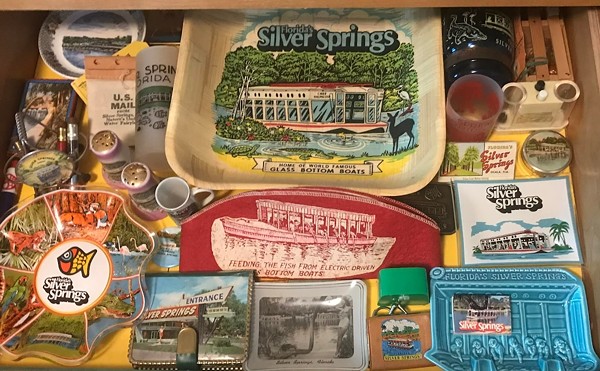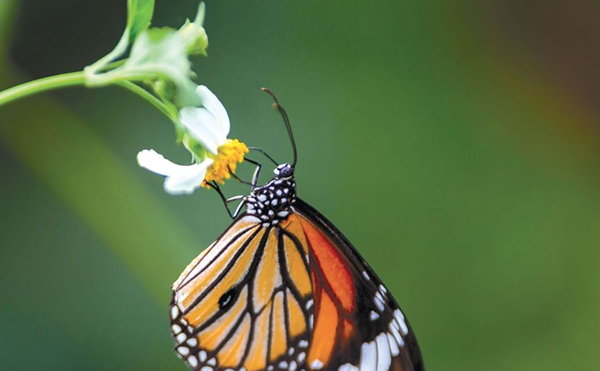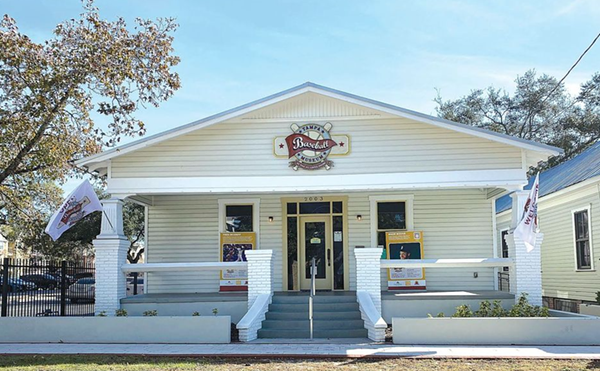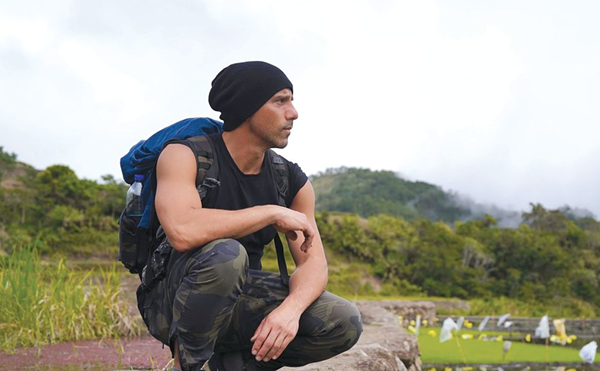When the union man came in to the factory with el patrón and pulled Vladimir Martinez de Vega — the lowliest and least skilled of tabaqueros — from his table for stealing the squirrel from in front of the Tampa Hotel, we all knew it wasn’t because he did it — it was because his uncle the lector, who we called La Voz, held more of our loyalty than el patrón himself. For months La Voz told us, in his ways, what was right and just and what was not about our working conditions and the working conditions of our compadres in other factories around Ybor. And for months, our patrón’s blood boiled like a good café cubano every time he caught La Voz straying from the words written in War and Peace or Fortunata y Jacinta, and to issues he knew would rile us up. But we had power, us tabaqueros. We paid the lector, not the patrón. And that was the difference: for us it was about pride; for the patrón, his factory was just a sea of tobacco leaves and stained hands, row after row of white shirts, of faceless men whose lives held less value than that of even one burro perdido.
So when Vladi was pulled up by his elbow, doe-eyed and stupid-looking as he always looked, we all mostly stopped what we were doing and listened, because of course Vladi’s uncle stopped talking about the wages in other places, syndicalism, strikes, impending walk-outs and god knows what else, jumped down from his tribuna (which always looked like half a prison to me), and marched right over to el patrón, who was standing there with some angry gringo from the hotel. We all knew one of us might have to wedge between the two to stop them from slicing each other’s guts with their chavetas, because while the patrón was the patrón and Vladi’s uncle was the lector, they’d both been tabaqueros at one time and, probably out of habit, kept their chavetas for protection — the patrón to protect against the thieves who knew he was the patrón, and Vladi’s uncle because he was more café and less leche, and the police often got confused when they believed they’d caught him socializando in the wrong club.
Funny enough, the gringo did all the talking while the patrón backed up, eyeing the rest of us with an anger so strong you could taste it.
“Why?” the gringo said. “You’re asking me why? Well, I’ll tell you. Because we don’t tolerate theft in my hotel, and we don’t tolerate thieves in this city. That’s why.”
“Pero I… I.” But Vladi stuttered horrendously in Spanish, and in English, man oh man he was as painful to watch as he was to listen to. “But I… I… didn’t take anything,” he said. “Ni un squirrel, ni un… un…” But he didn’t finish what he was saying before the police came and did what the gringo wanted them to do, which was drag Vladi out of the factory, past the patrón’s automobile, and off down the dusty road in their patrol wagon.
“I’ll come get you,” Vladi’s uncle yelled as they drove away, nearly knocking down the old cafetero, who was just then walking in to bring us our cafés. “No te preoccupas. Don’t worry!” Which he said, as always, in the same beautiful voice he told us stories in, and all the while face to sweaty face with the patrón, who in his own right was a man with a history but one not nearly as heavy as Vladi’s uncle, who we all knew fought in the war, though no one knew quite for certain for which side.
The patrón turned to walk to his office, but looked back (out of fear, we were sure, but under the guise of throwing a final remark) and said, “I had nothing to do with it. Te lo juro,” and continued on, leaving Vladi’s uncle to return to his platform to read a passage from Don Quixote, which we all knew held some clandestine secret for us all, and which if we didn’t know he so artfully implied by glancing at us as he was accustomed to, nodding in his heavy way: “I shall never be fool enough to turn knight-errant… to do as they did in the olden days…” which at least I, if not a few of us, would ask him to expound upon later on.
Later that night, in one of the back rooms of El Círculo Cubano, where we all went to proclaim our brotherly love and all that to each other but really went to play bolita and get a chance at some real money, Vladi’s uncle showed up with a scuffed-up but in-one-piece Vladi.
I looked Vladi up and down. “You look like they tossed you back to Havana and then dragged what was left of you to Ybor,” I told him.
“They… they… no,” he said. “I didn’t take the squirrel.”
“What squirrel?” I said. “What the hell is this squirrel?”
“The...the...”
“Some squirrel with some dogs over at the hotel,” La Voz said. “Supposed to be Plant’s dogs from France. Some lunacy. Au Coup de Fusil. I don’t know. But it wasn’t him. Wasn’t you, Vladi, no? No era tu, verdad?”
“No… no… no,” Vladi said. “I… I didn’t take no maldito squirrel.”
“Ridiculo,” said Calixto Velázquez de Cuéllar, who, it was rumored, always had his lips on Vladi’s uncle’s ass because of some nonsense about his great grandfather six or seven or eight times removed supposedly brought in black esclavos — slaves! — before becoming the first Adelantado of Cuba over what was once the Indies.
La Voz glanced at Calixto, but as usual returned to whoever else was nearby. “Anyway,” he said, “I’m taking Vladi home to get cleaned up. After that,” he said, looking at me, “you meet me over by the cañones at midnight. At the hotel. You know where?”
“I know where.”
“Bueno,” he said. He looked at Vladi; Vladi stared back. “Midnight,” he said.
And so we met at the cañones. It was me and La Voz and Vladi, and though it was clear it put a screw in Vladi’s uncle’s side, Calixto.
Calixto said, “We can take the two dogs and then they’ll have nothing. Frustrate them un poco, no?”
“That’s your brilliant idea?” La Voz said. “To be a criminal to prove we aren’t criminals?”
Calixto pointed to the dogs. “They’re right there,” he said. “Beside the oak trees.”
La Voz walked to the dim figures. We heard him urinating on them. When he returned, he said, “A jester never be.”
Vladi said, “I… I… no lo hice, lo que dicen. I stole nothing.”
“Anyway,” La Voz said. “The gringo has it out for you. And while I would say quedate, stay? I can’t. Not with any conscience. Not my sister’s son. Not now. Now you must go, chiquito.”
Calixto moved as if to speak, but when Vladi looked away, first at the cannons and then, sadly, into the night, he put his hand on Vladi’s shoulder and himself looked down at his feet.
I said, “What are you saying?”
La Voz said, “What needs to be said. Vladi leaves in the morning. Before the sun is up. Before the patrón and the policia and any goddamn bigmouth wakes up in Ybor. Before them, you will be gone, Vladi. Ya esta.”
Vladi looked at me and I looked at Vladi. Vladi said, “Help me?”
“Of course,” I said. “Claro.”
La Voz nodded. “Me and el brillante over here will head back to Ybor. You take him back to his casita, get his things. And Vladí, when you get to where you’re going — maybe go to Caya Hueso or someplace maybe a little closer, mandame una carta. Tell me where you are, but don’t sign your name. Just a little hello from wherever, vale?”
“I… I… claro,” Vladi said. And his uncle and Calixto left us standing there, in the middle of the night, by the cannons.
We walked along the river and then along Lafayette Street. It was warm and my shirt stuck to my back with sweat. Vladi was quiet for a bit. I lit two cigars from the factory and handed one to Vladi. He smoked half of his cigar as we walked and then, noticeably perturbed, scrutinized the cigar under the light of a streetlamp.
“You… you…?”
“No,” I said. “Calixto gave them to me.”
Vladi smiled. “I… I… I knew it, man.”
But it was a lie. I had rolled the cigars myself.
“You know,” Vladi said. “I… I… can’t stay because of my uncle.”
“Why say this, Vladi?”
“The squirrel? This is no re-reason to go. It’s because of my ti-tio.”
“What about him?”
“He is too much trouble. He… he…”
“No, hombre. All the lectores are the same in Ybor. All the patróns have issues with their lectores. Your uncle is no different.”
Vladi said, “Well… Well…” and shook his head, and that was that. We were quiet all the way to Vladi’s casita.
At the door, Vladi turned to me and, with that same yo no se que in his eyes that his uncle had, said, “You… you… are a good friend, hombre. The road ahead I… I… is mine to walk alone.”
Vladi leaned into me and hugged me, and I hugged him back. We had left Cuba together as acquaintances and in just a couple of years had become friends. But friends — tabaqueros, alligator fighters, swampland adventurers, escuchadores of the wisdom of the lectores, Vladi’s uncle and the various men who carried those beautiful voices before him, aside — we were just strands of tobacco at the will of so many things that we would never control no matter what. Not in our lifetimes. I smiled. I bid Vladi farewell.
Later, on the edge of Ybor, I stopped to smoke the rest of my badly rolled cigar. I felt as if the salted air that flew from the ocean blurred my vision with locura, because I swore I could see the patrón’s automobile with Vladi’s dirty knuckles at the wheel. But there was nothing wrong with my vision. Indeed it was Vladi, and indeed it was the patrón’s auto as well. I could see Vladi’s face when the light hit it just so, and I called out for Vladi, my voice overly loud in the darkness, frightening me so because I did not want to call attention to the crazy man. But Vladi could not hear me over the strength of his singing. Perhaps he had perfected the song and its words, because the whole time I listened to him he never stuttered a word. The Tampa grass was still moist and limp, and the bright sun was still dim past the wobbly homes and the lawns where women in their cloche hats would be playing obstacle golf later in the day, further out to the east, where all of them would be back in Ybor, sitting at their tables, piles of tobacco leaves all around them, but before that there — here — was Vladi, his voice macho like Vladi’s uncle’s voice was macho, and it was so pretty I felt I was back in Cuba, back in Havana, a king amongst kings listening to the prospects of the lands that lay ahead. And the funny thing? The funny thing about it, when the lights from the police car shone on the front of the patrón’s car, what stood there, shining like a lightning bolt in the troubled, in the humid night, was the maldito squirrel, or what looked like the squirrel, tied with metal wire, sparkling as Vladi hit the gas and the police, turning their sirens on and trying to turn around to chase that squirrel stealer, to chase that masculine, that singing, that non-stuttering voice, off into the heat of Florida, where, to my grief and yet to my adoration, we never heard it again, but hoped, one day, we would. Vladi, my friend. De puta madre, donde has ido?



